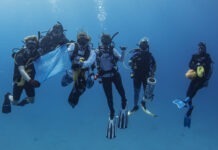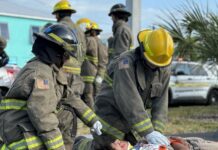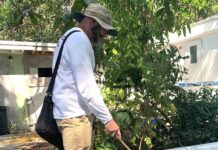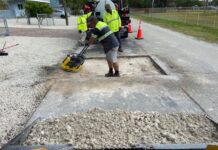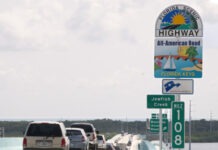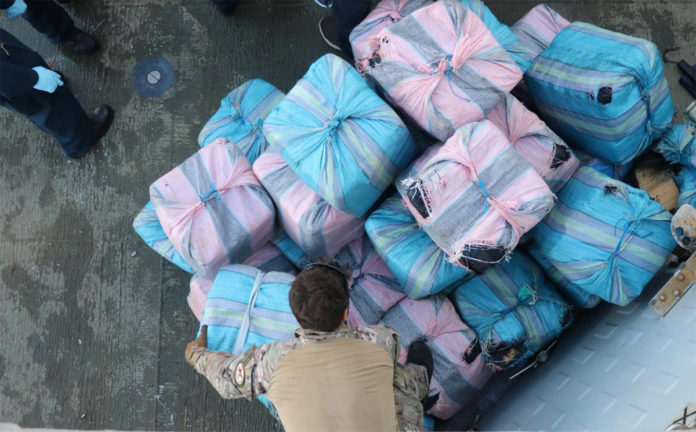
The arrest of drug kingpin El Chapo. The interdiction of 300 metric tons of cocaine. Monitoring human smuggling and shipments of bulk cash and weapons. And plans for a quarter-billion-dollar facility. These are not the usual topics of discussion for a Monroe County Board of Commissioners meeting. But they are all in a typical day’s work for Coast Guard Rear Admiral Doug Fears, the director of Joint Interagency Task Force South in Key West.
Fears came to the July 2021 BOCC session to announce plans for JIATF South’s headquarter’s renovation, raise awareness about its mission, and reveal a (tiny) bit about its covert operations.
“We work behind the wall in Truman Annex,” Fears said, referring to the name of the headquarters. “We’ve got people in 21 different countries around the hemisphere, and we do detection and monitoring for illicit activities in the Western Hemisphere, principally cocaine coming to the United States. Just this past year, we were a party to the interdiction of just about 300 metric tons of cocaine coming towards the United States.”
Fears emphasized JIATF South’s integral relationship with the Florida Keys, pointing out that the facility has 600 employees who live throughout the Lower Keys, including Marathon. Their salaries total more than $37 million.
“So all those resources are in this community,” he said.
Fears’ main presentation for the commissioners was the renovation of the Truman Annex, which received a lot of damage from Hurricane Irma.
“The question was raised, ‘Should JIATF South continue to operate in Key West, Florida?’” he said.
After exhaustive studies, Navy Admiral Craig Faller of U.S. Southern Command in Miami made the final decision in spring 2020 to keep JIATF South in Key West. The interagency task force was started in 1989 by the Reagan administration as part of its anti-drug enforcement policy, and the headquarters was originally in Panama. Eventually, the facility was moved to Key West.
JIATF South is a tenant of the U.S. Navy, but it also is part of an Army garrison, which means the Army pays for salaries and the facility.
Fears described this running of the Truman Annex by different agencies as “peculiar but it works.”
After the decision to keep JIATF South in Key West, he said, the Army committed $12 million to begin design of the command control facility, and they are “at the 35 percent point of designing the new facility.”
The Army estimates that the renovation of the headquarters will cost $250 million or $300 million and that breaking ground may begin in fiscal year 2025 or 2026.






“There are a lot of ‘ifs’ in there,” said Fears.
When the time came for the commissioners to ask questions after Fears’ presentation about the renovations, they couldn’t resist asking about JIATF South’s actual covert activities and his own role.
Commissioner Craig Cates said, “JIATF is a huge part of the community, a lot of great jobs and people who work there.” But, he asked, why are Coast Guard personnel usually picked to direct the agency?
“I’ve been doing drug interdiction on the high seas for 35 years,” Fears explained. “And so, because the interdiction and apprehension is connected to the monitoring of what the joint interagency task force does, it gives us a kind of an intimate understanding of the enterprise.”
Commissioner David Rice asked, “The mission has broadened considerably. Are you able to speak to some of those broader issues?”
“Illicit trafficking is Illicit trafficking,” Fears said. “It doesn’t matter whether it’s drugs, bulk cash, weapons, smuggling of humans. They’re all illicit activities. Illicit organizations are involved in those.”
JIATF South, he said, works with investigators from the DEA, FBI and Homeland Security. The drugs, once interdicted by the agency, give investigators an entrée into encountering international criminal organizations and drug kingpins — or what the Justice Department calls a Centralized Priority Organization Target, a.k.a. a “CPOT.”
“So what happens is the investigation builds over time, and then many times these investigations lead to the takedowns of CPOTs. And so El Chapo is probably one of the more famous ones recently. There were maritime interdictions that contributed to the investigatory effort that ultimately resulted in the extradition and takedown of one of Mexico’s worst CPOTs.”
With that, the commissioners thanked Rear Admiral Doug Fears both for his service and his presentation … then resumed with the more usual county topics.


